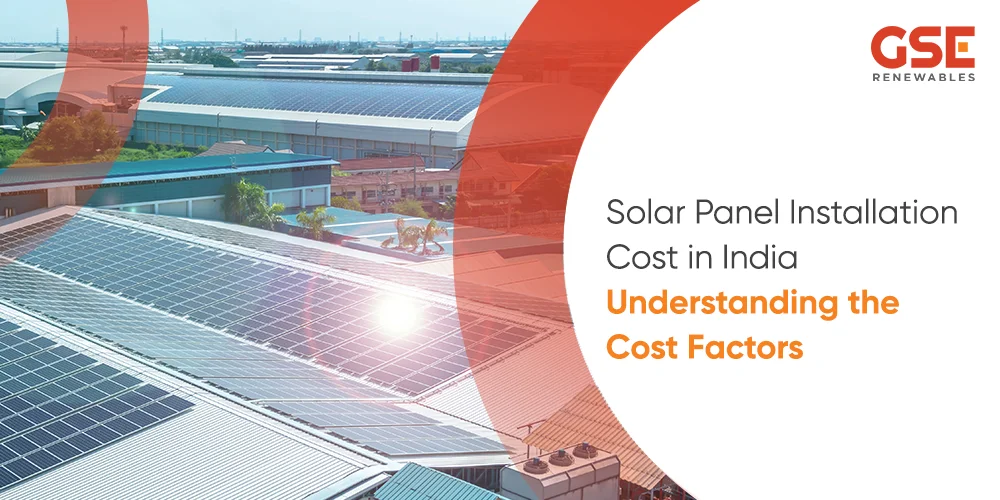500 kW Solar Power Plant Cost in Gujarat: Complete Price & Savings Guide
Nov 26

With rising energy costs, more industries & commercial users in India are adopting solar power as a reliable & cost-effective solution. Solar installations not only reduce electricity costs but also support sustainability helps to enhance energy independence & ensure long-term savings. At GSE Renewable Energy, we provide end-to-end solar solutions for commercial & industrial clients including rooftop systems, ground mounted plants & open access projects. Our solar panel systems, supporting capacities from 150 kW to 5 MW are designed to meet diverse business energy needs with maximum efficiency.
Connecting to GSE Renewable Energy, industries & commercial users gain access to reliable solar panel installations, customized designs & end-to-end support, helping them transition to renewable energy efficiently and profitably.
With rising electricity bills & increasing focus on sustainable energy, solar panel installation is considered the best solution for businesses across India. Solar energy provides long term benefits including energy independence & carbon footprint reduction. However, understanding the solar panel cost in India & the factors affecting the installation will help companies to take an informed decision.
Factors that are influencing solar panel installation costs in India include system capacity, panel type, inverter selection, mounting structures, installation complexity & project location. By considering these factors businesses can make informed decisions & estimate the final price for installing solar power systems.
Solar Panel System: The cost for solar panel installation depends on the type of solar power system. On grid systems are connected to the electricity grid & do not require batteries. Off grid systems which include battery storage for backup, offer energy independence but involve additional components.
Type of Solar Panels: The cost of solar panels varies based on their type & efficiency. Monocrystalline panels are highly efficient & ideal for maximizing energy generation in limited spaces. Polycrystalline panels are cost effective & suitable for standard energy requirements. Thin film panels are lightweight & used for specialized installations but have lower efficiency.
Inverter Cost: Inverters are components that convert the DC electricity produced by solar panels into usable AC power. It affects both performance & overall cost for solar panel installation. String inverters are reliable for standard systems while microinverters provide higher efficiency & better monitoring for each panel used for commercial installations.
Mounting Structure & Installation: Proper mounting structure will enhance the durability & optimal performance of solar panels. Rooftop solar installations utilize existing roof space which is mostly preferred for commercial buildings. Ground mounted solar systems are used for industries with available land, allowing flexibility in panel orientation & maximizing energy production.
Additional Considerations: Other factors including wiring, electrical components & battery backups for off-grid systems will contribute to overall system reliability, performance & long-term savings to install solar panel system.
In 2025, the cost of installing commercial and industrial solar systems in India varies based on system size, location, and available subsidies. For systems ranging from 150 kW to 5 MW, the average cost per kW typically falls between ₹35,000 and ₹40,000. Government initiatives, such as the Group Housing Societies (GHS) and Resident Welfare Associations (RWA) subsidy scheme, offer financial support of ₹18,000 per kW for common facilities, including EV charging infrastructure, up to a total capacity of 500 kW. This subsidy can significantly reduce the overall investment for commercial establishments.
Without subsidies, the upfront cost for installing solar systems in the 150 kW to 5 MW range remains between ₹35,000 and ₹40,000 per kW. For instance, a 1 MW system would cost approximately ₹4 to ₹5 crores, while a 5 MW system could range between ₹20 to ₹25 crores. These costs encompass components such as high-efficiency solar panels, inverters, mounting structures, and installation services.
The cost of solar power per kWh for commercial and industrial users is influenced by the total system cost and its energy output. For systems ranging from 150 kW to 5 MW, the average annual energy generation can vary:
Considering these outputs, the cost per kWh can be calculated by dividing the total system cost by the total energy generated over the system’s lifespan. This metric helps businesses assess the long-term financial benefits of transitioning to solar energy.
Calculating the cost of installing solar panels involves several steps:
For a more streamlined process, GSE Renewables offers a solar calculator to help businesses estimate the cost and potential savings of installing solar panels. This tool provides a customized assessment based on specific requirements and location.
The cost of solar panels per square foot for commercial and industrial installations depends on the system’s capacity and layout. On average, a 1 kW rooftop solar system requires approximately 100 square feet of space. Therefore, the cost per square foot can vary based on the total system cost and available subsidies. It’s essential to consult with a solar provider to get an accurate estimate tailored to your specific needs.
The monthly savings from installing solar panels depend on factors such as system size, energy consumption, and local electricity rates. For commercial and industrial users, a 1 MW solar system can generate approximately 18,000 to 20,000 kWh per month. Considering average electricity tariffs, businesses can achieve significant reductions in their monthly electricity bills. Additionally, the return on investment (ROI) for such systems is typically realized within 3 to 5 years, leading to long-term financial benefits.
Switching to solar energy in India is a smart and sustainable choice for businesses looking to reduce electricity expenses while minimizing their environmental impact. By evaluating the solar panel cost, understanding the cost for solar panel installation, and considering government incentives, companies can make informed decisions that maximize long-term savings. While the initial investment in solar panel installation in India may appear substantial, the benefits including reduced operational costs, energy independence, and a smaller carbon footprint make it a worthwhile and future-ready investment. GSE Renewables provides reliable solutions with competitive solar panel installation cost in India, helping businesses transition to clean energy efficiently and economically.
The solar panel cost in India varies based on system capacity (150 kW to 5 MW), type of panels, and installation requirements. GSE Renewables provides customized quotes and online tools to estimate your cost for solar panel installation.
ROI depends on your monthly energy consumption, electricity tariff, system capacity, and potential government incentives. GSE offers an online calculator to help commercial and industrial users estimate savings and payback periods.
Businesses can choose from on-grid, off-grid, and hybrid solar systems. On-grid systems are cost-effective and allow selling excess energy back to the grid, while off-grid systems provide energy independence with battery storage.
Space requirements vary depending on system size and panel efficiency. For instance, a 1 MW system typically requires 4–5 acres of land for ground-mounted installations. GSE helps design layouts optimized for available space.
Yes, the government offers incentives and subsidies for commercial and industrial solar projects, reducing the solar panel installation cost in India. Eligibility and benefits depend on the system capacity and location.
The solar panel cost per watt or per sq ft in India depends on panel type, system capacity, and installation complexity. GSE provides detailed cost estimates tailored for commercial and industrial setups.

Our Blogs With a combined experience of over 250 years and the successful management of 30 MW of solar energy projects, GSER offers the most efficient solutions. 500 kW Solar Power Plant Cost in Gujarat: Complete Price & Savings Guide What is a 500 kW...
Read MoreOur Blogs With a combined experience of over 250 years and the successful management of 30 MW of solar energy projects, GSER offers the most efficient solutions. Why Solar Power Is Booming in Gujarat for Businesses Over the last decade, Gujarat has become one of...
Read MoreOur Blogs With a combined experience of over 250 years and the successful management of 30 MW of solar energy projects, GSER offers the most efficient solutions. Solar Opex Model: For Rooftop Solar with No Upfront Investment What is the OPEX Model in Solar Energy?...
Read More